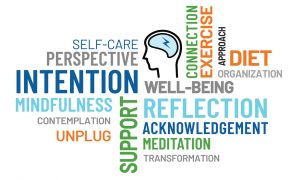Few people can deny that COVID-19 has been life-changing. In addition to the sheer number of lives lost, it has brought uncertainty about finances, changed personal relationships and altered work lives. The pandemic will have long-lasting effects many people won’t anticipate.
During the pandemic, working from home created isolation and loneliness, families and friends restricted social interaction, and mask-wearing, vaccinations and testing became routine. Various forms of stress have become a byproduct of the world of COVID-19 and its aftermath.
“In some ways, we have adjusted to life during the pandemic — so much so that all the stress we face feels normal, but the challenges are anything but normal,” says Cortland Dahl, chief contemplative officer at Healthy Minds Innovations and scientist at the Center for Healthy Minds at the University of Wisconsin-Madison. “Research shows that the effects of the pandemic on our mental health are much more far-reaching than first thought.”
Those effects can show in physical manifestations, including diminished immunity and accelerated aging. They may also cause changes in mental health, swaying a sense of emotional well-being.
“Remember, it’s totally natural to feel the struggle to make it through the day, and these feelings are predictable responses,” Dahl says. “It’s important to keep in mind that you’re not alone in these challenging times.”
Adapting to a post-pandemic lifestyle requires self-examination, contemplation and a fresh approach to managing time and family when pressures seem more present than ever.
“Living with this level of long-term stress, anxiety and lack of enjoyment can cause health problems such as heart disease, obesity, cognitive decline and depression,” says Katie Sandler, The Impact Coach, based in Fort Lauderdale, Fla. “Recognizing that chronic stress can negatively affect physical and mental health is the first step toward achieving better well-being. There are techniques to make it through challenging times.”
Acknowledging the pandemic’s effects
 The post-COVID world has brought with it a new set of challenges. “During the pandemic, people began to isolate themselves and change their social behaviors, in effect cutting themselves off from the networks that had previously helped them cope,” Dahl says. “Being told that COVID-19 could spread through contact with other people meant that suddenly people didn’t go shopping or attend community events, and they stopped inviting friends to their homes or venturing out to visit family. It became a real threat to continuing the supportive in-person socializing that so often serves as an outlet for dealing with frustrations, fears and doubts.”
The post-COVID world has brought with it a new set of challenges. “During the pandemic, people began to isolate themselves and change their social behaviors, in effect cutting themselves off from the networks that had previously helped them cope,” Dahl says. “Being told that COVID-19 could spread through contact with other people meant that suddenly people didn’t go shopping or attend community events, and they stopped inviting friends to their homes or venturing out to visit family. It became a real threat to continuing the supportive in-person socializing that so often serves as an outlet for dealing with frustrations, fears and doubts.”
Online communication removed the all-important personal contact and the chance to interact on a natural level. It became a way to connect without having to invest emotion or intimacy.
“In effect, these new coping behaviors removed genuine social interaction and support and replaced it with faces on a screen,” Dahl says. The key, he says, is to realize that physical distance between people doesn’t mean social distance.
“You can feel support from others without being in the same room,” he says. “For instance, you can use a technique we call ‘appreciative meditation’ to connect with someone by recalling their positive qualities. Role play in your mind to bring back a moment when this person was kind to you and recreate those feelings of support and compassion.”
He says that these reflective moments can help you feel closer to the person and might even trigger an action to establish a meaningful connection such as a telephone call or sending a message of gratitude.
“Connecting with people is crucial to getting back to normal,” Sandler says. “Having lunch with a friend, inviting a few people over to your home or re-engaging with a hobby or social organizations will help. It most likely will not be exactly the way it was before the pandemic, but it’s a strong first step
to resuming your life as you remember it.”
Moving toward mental wellness
 Both Sandler and Dahl recommend that understanding the connections between stress and physical or mental wellness is the first step toward healing.
Both Sandler and Dahl recommend that understanding the connections between stress and physical or mental wellness is the first step toward healing.
Sandler emphasizes the word “mindfulness” as a crucial way to make significant changes. “Mindfulness is synonymous with being fully present and paying attention to what is happening in the moment,” she says. “Being mindful can literally become a hard break from spiraling stress to allow you to focus on the here and now, identify feelings and increase awareness of the specific challenges at hand.”
Her other byword is “intention,” consciously deciding on a plan forward.
“First, set the intention to make your life less hectic, to clear the way to formulate your thoughts, plans and goals,” she says. “Decide to reduce your stress and chart a path to help you make the necessary changes to achieve that goal. You will have to put some work into it, but what you get back will be rewarding.”
Dahl also supports embracing a new perspective to break the cycle of stress and becoming more cognizant of the need to make a long-lasting transformation to better handle stress.
“By recognizing that stress or any kind of change not only affects your mental well-being but also your physical health as well, you can begin to adapt behaviors that will help you through these changing times,” says Sandler. “Admittedly, it may be difficult to understand exactly how your life has changed, but you can see the indicators: increased fatigue, burnout, foggy brain and a sense of feeling disconnected or alone. Although you’re tired, you’re not falling asleep easily or you’re tossing and turning all night.”
Dahl’s program at Healthy Minds Innovations has done extensive research on how meditation can positively influence people’s ability to cope with change and break the cycle of stress. Based on meditation principles, the technique helps people unplug and focus on prioritizing their own well-being.
“The good news … we can learn simple skills to manage our stress and learn and grow from adversity,” Dahl says. “Stress can be overwhelming at times, but the research shows that even five minutes a day of a simple practice like meditation can have a large impact on our lives and help us respond to stress in a healthy way.”
Strategies for stress management
 Life is stressful, especially in the post-pandemic world. Competing priorities like work, family and other responsibilities can leave little time to focus on your state of mind. You are not alone. But ignoring stress can result in physical and mental consequences such as fatigue, substance abuse and depression.
Life is stressful, especially in the post-pandemic world. Competing priorities like work, family and other responsibilities can leave little time to focus on your state of mind. You are not alone. But ignoring stress can result in physical and mental consequences such as fatigue, substance abuse and depression.
Change your diet. Rather than turning to comfort foods while stressed, healthier (but still delicious!) food such as fatty fish, carrots and nuts can help reduce stress levels. Drinking tea can calm nerves, too.
Get active! Many find it useful to run or walk to clear their mind and reduce stress. Any exercise can reduce stress as your brain releases chemicals such as endorphins and dopamine.
Meditate. Meditating for a few minutes a day can help ease stress and lower anxiety levels.
Get involved in the community. Donate your spare time to help your community. Volunteer at a local soup kitchen, visit your local animal shelter, or help people in your community who may need an extra hand.
Find support. It’s important to share your problems with others rather than keep them bottled up inside. Depending on the issue, talking to a trusted friend, family member or counselor can help.
Organize your living space. Living in an unorganized environment can create more stress. Find some time to organize your living space to live a less cluttered life.
Speak to your doctor. Stress and depression are major health issues, and it’s important to get professional medical help. Millions of adults in the U.S. suffer from anxiety and depression. You’re neither abnormal nor alone.
If you are thinking about suicide, worried about a friend or loved one, or in need of emotional support, call or text 988, the Suicide and Crisis Lifeline. The three-digit dialing code will route callers to the National Suicide Prevention Lifeline.







